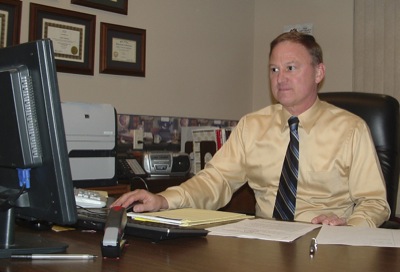Wednesday, February 8th, 2012
Some business tax savings available
By Christine Henderson

Photo by Christine Henderson/The Daily Standard
Jim Harting of Moorman, Harting & Co., works in his Coldwater office.
Small business owners should make sure to follow all income tax regulations. The Internal Revenue Service is watching, local CPAs warn.
"I would caution businesses that the government is tightening the screws a little bit," Rick Mosier, certified public accountant of Mosier and Byers CPAs, Celina, said.
Federal officials estimate a $300 billion gap nationwide between what is paid and what should be paid in income taxes, he said. The IRS will be checking if all the correct forms have been filed so no money escapes from assessment of taxes.
"All governments are looking to increase their revenues, and they think this is an area where they can gain without raising taxes," Mosier said.
Small businesses need to keep track of incoming expenses for the year and possibly mileage, if a personal car can be deducted, said Kim Ray, CPA with Siefring & Associates CPAs, St. Marys.
One benefit in 2011 and 2012 is depreciation of equipment, said James W. Harting, CPA, of Moorman, Harting & Co.'s Coldwater office.
A small business/farm operator may write off capital expenditures on equipment purchases immediately rather than over years for items costing up to $500,000 in 2011 and $139,000 in 2012.
"It can make a significant savings," Harting said.
New equipment, including farm machine sheds and shops, are eligible for 100 percent bonus depreciation for 2011 purchases and 50 percent if placed in service during 2012, Harting said.
New for 2011, landlords may use the bonus depreciation, Harting said. For landowners renting out farms, the bonus depreciation would cover expenditures for such improvements as drainage tile instead of having to depreciate over 15 years. Building owners could have new appliances covered, he said.
Self-employed people may want to consider establishing a Simplified Employee Pension-Individual Retirement Account (SEP), which can still be accomplished for 2011 until April 15, Harting said.
Like an Individual Retirement Account (IRA), a SEP defers the taxes until withdrawal at retirement, Harting explained.
"If you have high income (for 2011), the SEP is something you can do before April 15 and get an extra deduction," he said.
Ray reminded unincorporated small business operators that they do not need to pay payroll taxes for their spouse and children under age 18.
The payroll taxes, which had been reduced through 2011 for employees, continues through this month, Ray said. At this point, the taxes are scheduled to go from 13.3 to 15.3 percent in March. Congress has been talking about extending this deduction for some, she noted.
While gathering paperwork for filing 2011 taxes, business owners and other individuals may want to consider one personal tax credit sometimes forgotten, Harting said. The tax credit for students in higher education also continues through 2012.
One education credit, the American Opportunity Credit, is 100 percent on the first $2,000 of tuition and related expenses and 25 percent on the second $2,000.
Beware the ides of April, 2013:
As currently legislated, the federal income tax code will increase some area residents' costs next year.
"There may be drastic changes in 2013" to the whole tax system, said Rick Mosier of Mosier and Byers CPAs, Celina.
Income tax is set to increase greatly for the upper income, said James Harting of Moorman, Harting & Co. in Celina and Coldwater.
For instance, the top tax bracket in 2013 is slated to be 39.6 percent, instead of the current 35 percent. The wealthiest also will be charged a new Medicare tax - 3.8 percent on unearned income, such as capital gains, real estate income, dividends and interest, and a 0.9 percent on earned income.
So, the truly wealthy could face around a 45 percent federal tax burden, Harting noted.
The taxes paid in 2013 on capital gains, estates and gifts also will be going up drastically, unless Congress changes laws, Harting added.
"If you are thinking of selling, consider it in 2012," Harting said. "If you are thinking of gifting large amounts, consider doing it in 2012."
Through 2012, the capital gains and dividends taxes are 15 percent or less for everyone. In 2013, the qualified capital gains tax rate will rise to 20 percent and qualified dividends will be taxed as ordinary income.
Also in 2013, the estate/gift tax breaks could sunset, Harting said.
The federal estate tax rate will leap 20 percent. Currently, this tax is only due if the estate is worth more than $5.12 million, but in 2013 estates worth over $1 million must pay, Harting said.
Now people are exempted from paying a gift tax if the gifts for a lifetime stay under $5,120,000. However, next year people will have to pay taxes on lifetime gifts that total more than $1 million.
"Obviously, this could all change, depending on the November election," Harting noted about 2013 tax rules.
- Christine Henderson





